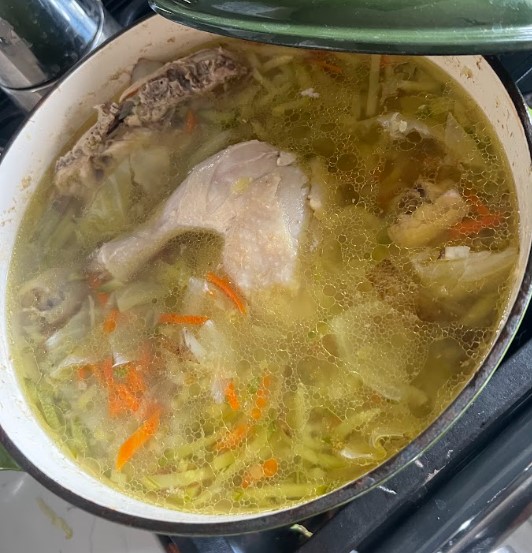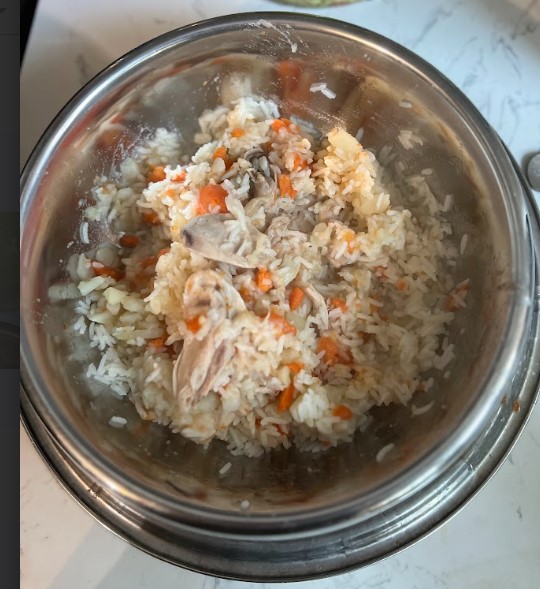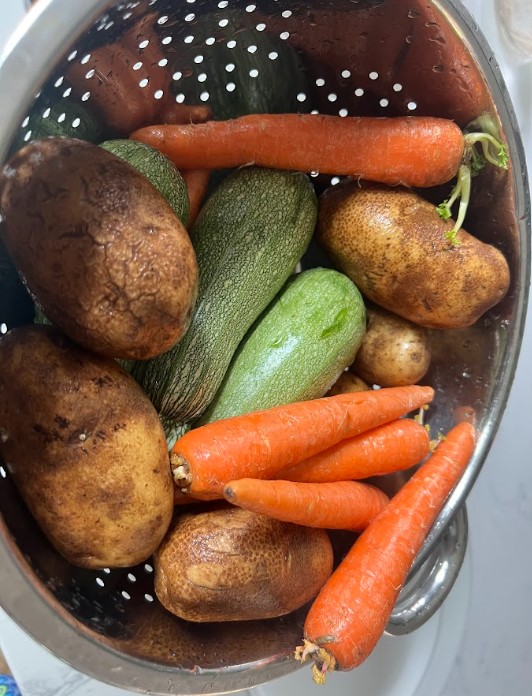It is generally safe for your sheepadoodles to eat a variety of foods, including many human foods. However, some human foods can be toxic to your sheepadoodles, so it is important to be cautious when feeding them home-cooked meals.
If you’re looking for a sheepadoodle, check out our available sheepadoodle puppies.
Here are a few simple, healthy recipes that are the best food for your sheepadoodles that you can try at home.
Peanut butter dog treats: Combine 1 cup of whole wheat flour, 1 cup of rolled oats, 1/4 cup of peanut butter, and 1/2 cup of water in a bowl. Mix until well combined, then roll out the dough and use a cookie cutter to cut out shapes. Bake at 350°F for 20-25 minutes, or until golden brown.
Chicken and rice: Cook 1/2 cup of brown rice and 1/2 cup of diced, cooked chicken in water or chicken broth until the rice is tender. Mix the rice and chicken together and serve as is, or add a small amount of vegetables such as carrots or peas. To make it easier, I sometimes buy canned peas (be sure to drain all the water and rinse off to get rid of the extra sodium in the cans), I buy chopped up potatoes already, and throw everything in a big pot to make it easier. Sometimes shopping at discounted places such as the Grocery Outlet can get you the best deals on those items. This recipe is easy and may be one of the best food for your sheepadoodles as it contains all the right nutrients.
Vegetable and beef stew: Cook 1/2 cup of diced beef and a variety of vegetables (such as carrots, peas, and green beans) in water or beef broth until the beef is cooked through and the vegetables are tender. Mix everything together and serve. You can also use ground beef. I sometimes buy the 3lb ground beef in from the Grocery Outlet for $6 and use 1/3 for every pot I make. I don’t normally drain the fat, but keep it all especially to feed my sheepadoodles who need more calories.
Homemade ice cream: Cup of kefir (lactose free), add chia seeds, peanut butter. Mix all 3 ingredients together. Leave in freezer and take out and serve as ice cream. This is a fun and a cheaper way to feed them ice cream. I’ve found that a a tiny cup of dog ice cream at the store is $3 and you could make so much more by buying kefir.



Always consult with your veterinarian before making significant changes to your dog’s diet. Those are the dishes that I often feed them and I believe that they’re the best food for your sheepadoodles. I generally feed chicken to keep their weight. If I’m feeding a pregnant or nursing mom, I’d use ground beef and up their calories. If they’re fed a well-rounded diet, their skin and fur will show it!
Here is a list of some safe, healthy foods that you can consider feeding to your dog
Meat: Cooked chicken, beef, turkey, and lamb are all good sources of protein for dogs. Be sure to remove any bones and trim off any excess fat before feeding.
Fruits: Many dogs enjoy fruits as a treat, and some safe options include apples, bananas, watermelon, and blueberries.
Grains: Cooked rice and pasta are safe for dogs to eat, as are small amounts of whole grain bread.
Dairy: Small amounts of plain, unsweetened yogurt and hard cheeses can be safe for dogs to eat in moderation, however, most dogs are lactose intolerant and these items should only be an occasional treat fed in very small amounts.
Vegetables
Dogs can safely eat a variety of vegetables, such as carrots, green beans, sweet potatoes, and bell peppers.
Carrots: Carrots are a good source of fiber and beta-carotene and can be a healthy treat for dogs. They can be given raw or cooked.
Green beans: Green beans are a low-calorie, low-fat vegetable that can be a good source of fiber for dogs. They can be given raw or cooked.
Broccoli: Broccoli is a good source of fiber, vitamins, and minerals, but it should be given in moderation as it can cause digestive upset in some dogs.
Cucumbers: Cucumbers are a low-calorie, low-fat vegetable that can be a good source of hydration for dogs. They can be given raw or cooked.
Peas: Peas are a good source of fiber and protein and can be a healthy addition to a dog’s diet. They can be given raw or cooked.
Sweet potatoes: Sweet potatoes are a good source of fiber, beta-carotene, and other vitamins and minerals. They can be given cooked and mashed or in small amounts as a treat.
Squash: Squash, such as zucchini and pumpkin, is a good source of fiber and vitamins and can be a healthy addition to a dog’s diet. It can be given cooked and mashed or in small amounts as a treat.
I generally cook all the vegetables with the protein as I find they don’t like eating raw things as I thought they would. If combined with a protein, you’re creating some of the best food for your sheepadoodles.

It’s important to remember that vegetables should only make up a small part of a dog’s diet and should be given in moderation. As with any new food, it’s a good idea to introduce vegetables gradually and to monitor your dog for any signs of digestive upset. If you have any concerns about your dog’s diet, it’s always best to consult with your veterinarian.
Here is a list of dangerous foods that you should avoid feeding to your dog
Chocolate: Chocolate contains theobromine, which is toxic to dogs. The darker and more bitter the chocolate, the more dangerous it is.
Grapes and raisins: Grapes and raisins can cause kidney failure in dogs.
Onions and garlic: These vegetables contain compounds that can damage a dog’s red blood cells and lead to anemia.
Avocado: Avocado contains persin, which can cause vomiting and diarrhea in dogs.
Nuts: Some nuts, such as macadamia nuts and walnuts, can cause vomiting, tremors, and hyperthermia in dogs.
Fatty foods: Fatty foods can cause pancreatitis in dogs, which is a serious and potentially life-threatening condition.
Alcohol: Even small amounts of alcohol can be dangerous for dogs, causing vomiting, diarrhea, difficulty breathing, tremors, and even coma or death.
Cooked bones: Cooked bones can splinter and cause blockages or tears in a dog’s digestive system.
Xylitol: This artificial sweetener, commonly found in sugar-free gums and candies, can cause a rapid insulin release in dogs, leading to hypoglycemia (low blood sugar). Symptoms include vomiting, loss of coordination, and seizures.
Caffeine: Caffeine can be toxic to dogs and can cause restlessness, rapid breathing, heart palpitations, muscle tremors, and even death.
It’s important to keep these dangerous foods out of reach of your dog and to contact your veterinarian immediately if you suspect your dog has eaten something toxic.







One Response